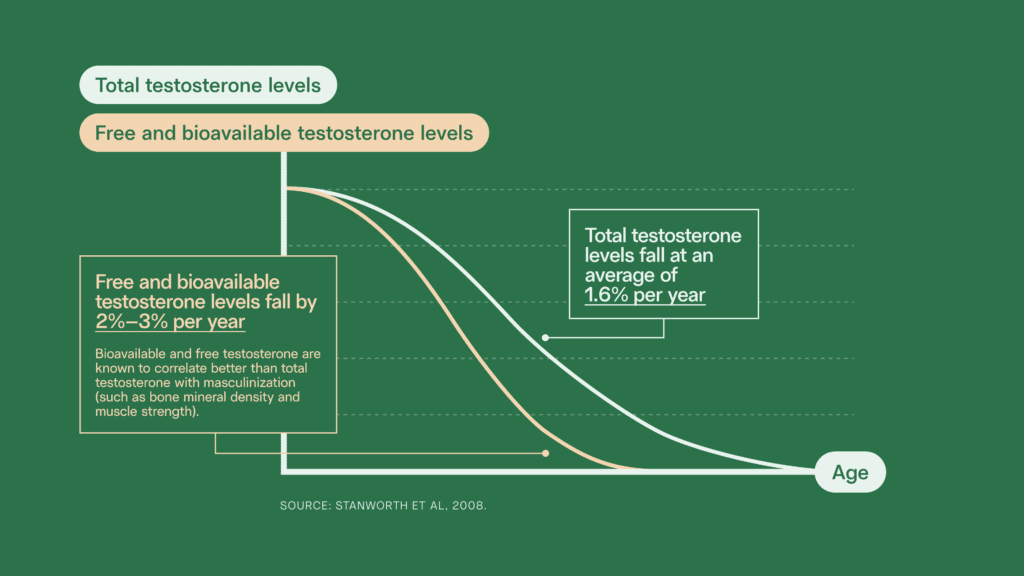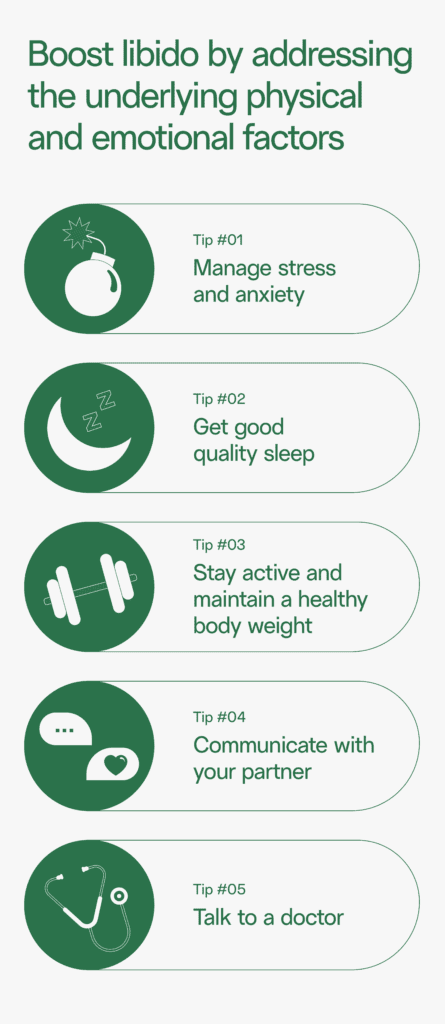Balancing work and life commitments can cause your libido to take a dip, and the reality is that sometimes you’re just not in the mood. But what happens if you’re trying to conceive? If you find yourself with a lower sex drive, you may have concerns or questions about whether it will impact your fertility. In this article, we’ll identify some common causes for a decrease in sex drive, and provide recommendations for how to increase male libido to address male-factor infertility.
Key takeaways
- Many physical and mental factors impact your sex drive. As you age, it is normal to experience a decline.
- There is no such thing as a “normal libido,” as it varies from individual to individual and will change over your lifetime.
- The most effective way to increase libido is by addressing the underlying physical and emotional factors that have contributed to low sex drive.
- If you are concerned about male fertility, consider taking an at-home semen analysis to learn more about the quality of your sperm.
What is sex drive or libido?
You know the feeling that strikes after a romantic date or when your mind wanders and entertains your wildest fantasies — an ache and desire to engage in sexual activities? That longing for sex is your sex drive, commonly referred to as libido.
While sexual arousal refers to the physical response your body produces — like getting an erection or lubricating — sex drive refers to the mental interest and desire for sexual activities. (Of course, arousal and drive are closely linked.) Libido varies greatly within the general population, and can even change over time based on several factors.
What influences libido?
Your sex drive will naturally fluctuate based on a variety of physical and mental factors, including:
- Your lifestyle
- Your physical health
- Hormone levels
- Any medications you may be on
- Outside stressors
- Mental health challenges, like depression
- Issues within your relationship
Understanding the numerous factors that impact your sex drive can alleviate the stress that arises when you notice a dip in your libido — while helping you identify ways to address it and increase your libido, if it is causing issues.
Is there such a thing as a “normal libido”?
Because libido levels vary so much within the general population, there is no such thing as a “normal libido.” Some people have naturally high sex drive, while others have lower sex drives. Sex drive is likely to shift throughout your lifetime.
Remaining aware of your sex drive is beneficial, because it can be an indicator of general health and quality of life. While your libido can and will fluctuate, significant changes can be a sign of other issues.
Causes of lower male sex drive
It can be difficult to talk about having a lower sex drive, especially for cisgender men, who often face societal pressures that equate sex with masculinity. The good news? Low libido is fairly common. In one study, about 5% of middle-aged men surveyed experienced low sexual desire due to a combination of lifestyle factors and comorbidities.
Depression is associated with a symptom known as “anhedonia,” the inability to feel enjoyment or pleasure from activities you once enjoyed. For many people experiencing depression, that includes sex. Studies have found that over 1 in 3 men with depression report decreased libido.
Your sex drive may gradually decline as you get older. That’s because testosterone is a sex hormone that plays an integral role in sex drive (as well as fertility and sperm production), and as cisgender men age, testosterone levels naturally drop.

A decline in hormone levels isn’t the only culprit for low libidos. As we age, medical conditions (and the medications to treat them) become more prevalent, and can potentially impact our sex drive later in life. Cardiovascular disease, diabetes, weight gain, and high blood pressure can all cause a lower sex drive.
Other potential causes of low sex drive in males include hormone imbalances (such as low testosterone), chronic illness, stress or sleep disturbances, or substance use, including alcohol.
The relationship between sex drive and male fertility
Low sex drive isn’t necessarily a symptom of male infertility. But in some cases, the two issues may be correlated. Several factors and conditions that affect sex drive also have an impact on male fertility, including:
- Erectile dysfunction
- Testosterone deficiency
- Advanced age
- Lifestyle factors, such as poor sleep or obesity
For those who are trying to conceive with low testosterone, it is important to note that it is possible to have low testosterone without fertility issues. Testosterone is just one of the hormones that influences sperm production. Learn more about the hormones that drive male fertility.
While many men don’t think of themselves as having a “biological clock,” male fertility declines significantly with age. Especially after age 40, sperm production decreases and becomes less effective, resulting in lower sperm counts, poorer motility (how well your sperm are moving or swimming), and higher percentages of sperm with genetic damage.
If you and your partner are having issues conceiving, you may consider male fertility testing since statistically, people with sperm play a role in 40–50% of infertility cases.
How the stress of infertility may impact sex drive
The stress of infertility can be enough on its own to affect an individual’s sex drive. Under stress, your body releases cortisol, a hormone that triggers your body’s natural fight or flight response. It also results in a low sex drive.
Individuals that are struggling with infertility may face issues with self-image and confidence. Lower levels of self-esteem can have a significant impact on sex drive. Communicating these issues with your partner and seeking help from a therapist or counselor can empower you to overcome a negative self-image.
When you’re stressed about your ability to conceive, or you’ve been trying for a while, your sex life may become less spontaneous and exciting, or even feel like a chore. It doesn’t help that sex while trying to concieve is typically on a schedule. The added pressure to perform can be enough to give some people an issue known as “situational erectile dysfunction.”
That’s why it’s important to maintain romance in your sex life when trying to conceive. Don’t forget about the details — candles, date nights, late-night massages, whatever works for you — that set the mood and make sex an opportunity to connect with your partner.
How to increase male libido

The best and most effective way to increase male libido is by addressing the underlying physical and emotional factors that caused sex drive to decrease. Consider which factor or combination of factors are most likely to impact you, and create a game plan to adopt some of the following practices into your routine.
- Manage stress and anxiety. Busy work schedules, financial and personal responsibilities, big life changes… It’s an unavoidable fact: Life can be stressful. Luckily, there are many ways you can manage stress and anxiety whether that means journaling, meditating, engaging in a favorite hobby, or talking to a therapist. (Bonus: Sex itself can decrease your stress, so if you can get into it, it might become a positive spiral.)
- Get good quality sleep. Practicing good sleep habits can be the difference between a night of restful sleep and a night of tossing and turning. Improve your sleep hygiene by ditching the screens before bed, maintaining a nighttime schedule, and creating a quiet, dark, and relaxing environment.
- Stay active and maintain a healthy body weight. Staying physically fit has many benefits for both your physical and mental health. In addition to increasing your sex drive, regular exercise can also improve your sperm health.
- Communicate with your partner. If your relationship is causing you stress, or you feel like the differences in your libido are creating tension, put in the time and effort to address it. For some, it may be as simple as a conversation, while others may seek professional help through a relationship counselor.
- Talk to a doctor. Don’t be afraid to seek medical help if you think you may have other medical conditions that are impacting your libido, take medications that may affect your sex drive, or are struggling to increase your libido on your own.
How to improve fertility
Receiving a male-factor infertility diagnosis can be jarring and stressful for all parties in a relationship. The best method for treating male-factor infertility will depend on the diagnosis and cause.
The good news is that many of the better lifestyle habits you might try to increase your libido can also have a positive impact on your sperm (and vice versa). The best ways to improve your sperm health on your own include:
- Quit smoking and reduce alcohol consumption. Avoid marijuana or other recreational drugs.
- Get in a regular, moderate exercise routine — even just walking or jogging 4–6 days a week may improve sperm health.
- Lose weight (if overweight or obese).
- Adopt a diet that’s rich in fruits and vegetables, fish, healthy fats, and whole grains, and low in red meat, processed foods, added sugars, and trans fats. The Mediterranean diet is one example of an eating pattern that’s been associated with improved semen parameters.
- Aim to get 7–9 hours of quality sleep per night.
Advanced treatment options for male-factor infertility can include:
- Intrauterine insemination (IUI)
- In vitro fertilization (IVF)
- Intracytoplasmic sperm injection (ICSI)
- Hormone therapy
- Surgery
If you are thinking about pursuing male fertility treatments like IUI or IVF now or in the future, you should consider sperm freezing. Once sperm is frozen, it can be stored indefinitely without affecting its ability to create a pregnancy.
Male fertility testing options
Traditional male fertility testing involves visiting a urologist to provide your medical history and receive a physical exam, during which the doctor will examine your genitals, collect a semen sample, and run blood tests.
However, male fertility testing doesn’t need to be an invasive, expensive, or time-consuming process. Sperm testing and freezing kits offer a comfortable and quick way to evaluate male fertility. Learn more about how at-home sperm testing works.



